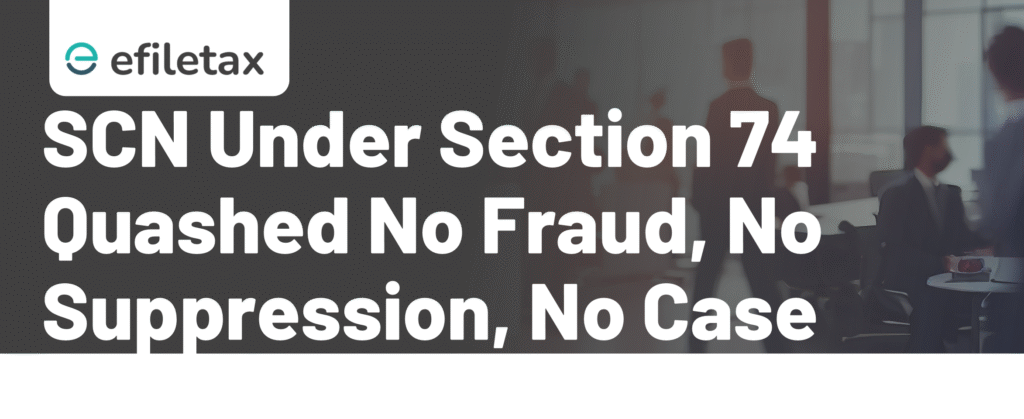
SCN under Section 74 Quashed Key Distinction from Section 73
When can tax authorities issue a notice under Section 74 of the CGST Act? A recent High Court ruling clarified that unless the department specifically alleges fraud, wilful misstatement, or suppression of facts, it cannot bypass Section 73 and invoke Section 74.
This decision reinforces the legal requirement of mens rea (guilty intent) for extended time limits under Section 74.
Understanding Sections 73 vs. 74 of CGST Act
| Feature | Section 73 | Section 74 |
|---|---|---|
| Nature of case | No fraud or suppression involved | Fraud, wilful misstatement, or suppression of facts present |
| Time limit | 3 years from due date of annual return | 5 years from due date of annual return |
| Penalty | Up to 10% of tax or ₹10,000 | 15% to 100% of tax amount |
| Pre-show cause notice | Required (SCN under Rule 142(1A)) | Required, unless waived |
| Burden of proof | On department to show shortfall | Higher burden — must prove intent to evade |
Why the SCN under Section 74 Was Quashed
In a recent case, the department had earlier issued a show cause notice (SCN) under Section 73, but did not proceed with it. Later, they issued a new SCN under Section 74 on the same set of facts, without adding any fresh allegations of fraud, misstatement, or suppression.
High Court’s View:
- The second SCN under Section 74 was not legally tenable.
- No new facts or allegations were introduced to justify invocation of Section 74.
Legal Principle: Extended limitation under Section 74 is only allowed when there’s a clear charge of fraud, wilful misstatement, or suppression of facts with intent to evade tax — not otherwise.
Legal Reference
- Sections Involved:
- Section 73 – Recovery of tax not involving fraud
- Section 74 – Recovery of tax involving fraud or suppression
- Relevant Rule:
- Rule 142(1A) – Opportunity to respond before SCN
- Case Law Cited:
- [Insert High Court name and case citation once final judgment source is published]
Expert View: Taxpayer’s Right to Natural Justice
“Issuing an SCN under Section 74 without clearly alleging fraud violates the principle of natural justice. Taxpayers must not be subjected to harsher provisions unless there is clear intent to evade tax.”
– CA Meera Nair, Indirect Tax Expert
Practical Takeaways for Taxpayers
- Always check if the SCN has specific allegations of fraud or suppression.
- Do not ignore pre-SCN intimation under Rule 142(1A); respond in writing.
- Keep evidence of all communications and returns filed to show bona fide conduct.
- Consult a professional to draft responses and file writ petitions if required.
FAQ Section
Q1. Can the department switch from Section 73 to 74 later?
Only if fresh facts or evidence show fraud or suppression. Otherwise, it’s legally invalid.
Q2. What if I already replied to the first SCN under Section 73?
That reply remains valid. A fresh SCN under Section 74 on the same grounds may be challenged in court.
Q3. Will penalties be different under 73 and 74?
Yes. Section 74 attracts up to 100% penalty, whereas Section 73 is limited to 10%.
Final Words
The CGST framework distinguishes clearly between genuine errors and intentional evasion. At Efiletax, we help you:
- Respond to GST notices
- File writs in appropriate cases
- Avoid penalties through timely action
👉 Book your GST Consultation Now
Summary
A High Court quashed an SCN under Section 74 issued without alleging fraud or suppression. Taxpayers should verify whether allegations meet this threshold, or they can challenge such notices.